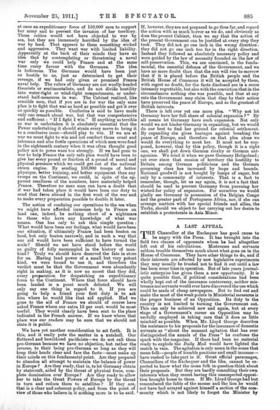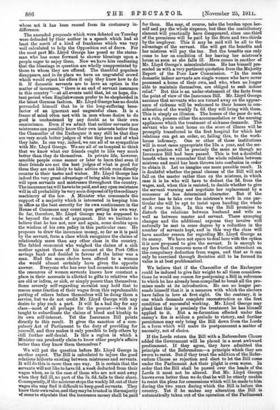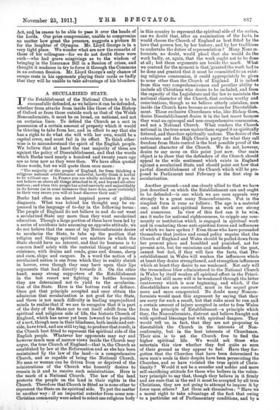A LAST APPEAL. T HE Chancellor of the Exchequer has good
cause to be angry with the Press. It has brought into the field two classes of opponents whom he had altogether left out of his calculations. Mistresses and servants seldom trouble themselves much about what goes on in the House of Commons. They have other things to do, and if their interests are affected by new legislative experiments they may usually be trusted not to find it out until a law has been some time in operation. But of late years journal- istic enterprise has given them a new opportunity. It is quite possible that, if political considerations had been wholly kept out of the insurance controversy, neither mis- tresses nor servants would ever have discovered the use which could be made of cheap newspapers. But to find out and make the most of the weak points in Ministerial measures is the proper business of an Opposition. Its duty to the country is not limited to turning the Government out. This can only be achieved now and again, but at every stage of a Government's career an Opposition may be usefully employed in taking care that it does as little mischief as possible. When Mr. Lloyd George describes the resistance to his proposals for the insurance of domestic servants as " about the meanest agitation that has ever distinguished the annals of the Press " he confuses the spark with the magazine. If there had been no material ready to explode the Daily Mail would have lighted the match in vain. The agitation is only mean in the sense that mean folk—people of humble positions and small incomes— have rushed to take part in it. Great official personages, Chancellors of the Exchequer and the like, cannot be ex- pected to know what the mean folk in question think about their proposals. But they are hardly consulting their own interests when they resent having this unsuspected opposi- tion brought home to them. If Mr. Lloyd George had but remembered the fable of the mouse and the lion he would not have had arrayed against himself a section of the com- munity which is not likely to forget the Minister by whose act it has been roused from its customary in- difference.
The amended proposals which were debated on Tuesday were defended by their author in a speech which had at least the merit of a kind of frankness which was very well calculated to help the Opposition out of doors. For the most part Mr. Lloyd George has posed as the states- man who has come forward to shower blessings upon a people eager to enjoy them. Now we have him confessing that the blessings in question are wholly unappreciated by those to whom they are offered. The thankful populace disappears, and in its place we have an ungrateful crowd which would reject his offers if only they knew how to do it. If domestic servants are to have an option in the matter of insurance, " there is an end of servant insurance in this country "—at all events until that, let us hope, dis- tant period when Englishwomen prefer to be shepherded in the latest German fashion. Mr. Lloyd George has no doubt persuaded himself that he is the long-suffering bene- factor of an ignorant and ungrateful class. It is a frame of mind often met with in men whose desire to do good is unchastened by any doubt as to their own omniscience. Even if we admit that neither servants nor mistresses can possibly know their own interests better than the Chancellor of the Exchequer it may still be that they are very much better judges of what they love and of what they hate. In one way, indeed, we can all of us sympathize with Mr. Lloyd George. We are all of us tempted to think that we know what our friends ought to like very much better than they do themselves. In private life, however, sensible people come sooner or later to learn that even if their friends are not the best judges of what is good for them they are not likely to take advice which runs directly counter to their tastes and wishes. Mr. Lloyd George has indeed the very great advantage of being able to impose his will upon servants and mistresses throughout the country. The insurance tax will have to be paid, and any open resistance will in all probability be very soon disposed of by the ordinary machinery of the law. A Minister who commands the support of a majority which is interested in keeping him in office as the best security for its own continuance in the House of Commons may count upon getting his own way. So far, therefore, Mr. Lloyd George may be supposed to be beyond the reach of argument. But we hesitate to believe that he has not, now and again, some doubts upon the wisdom of his own policy in this particular case. He proposes to draw the insurance money, so far as it is paid by the servant, from a class which recognizes the claims of relationship more than any other class in the country. The fabled economist who weighed the claims of a sick mother against those of his account at the Post Office savings bank and decided in favour of the latter was a man. Had the same choice been offered to a woman she would almost certainly have given the opposite answer. Everyone who has ever had occasion to ascertain the resources of women servants knows how constant a place in their accounts is allotted to gifts to relatives who are old or infirm, or sick, or simply poorer than themselves. Some severely self-regarding moralist may hold that to rescue some fraction of their wages from this reprehensible putting of others before themselves will be doing them a service, but we do not credit Mr. Lloyd George with any desire to play such a part. It will be a bad day for any class—most of all perhaps for the poorest—when it is taught to subordinate the claims of blood and kinship to its own self-interest. Yet the Insurance Bill points directly to this result. It gives the sanction of a com- pulsory Act of Parliament to the duty of providing for yourself, and thus makes it only possible to help others by still further self-denial. Is this a region in which a Minister can prudently claim to know other people's affairs better than they know them themselves ?
We will put the question before Mr. Lloyd George in another aspect. The Bill is calculated to injure the good relations hitherto existing between mistresses and servants. It will do this in more than one way. It is certain that the servants will not like to have 3d. a week deducted from their wages when, as in the case of those who are not sent away when they fall ill, no part of the 7s. 6d. falls to their share. Consequently, if the mistress stops the weekly 3d. out of their wages she may find it difficult to keep good servants. They know their own value, and they maybe trusted in the majority of cases to stipulate that the insurance money shall be paid for them. She may, of course, take the burden upon her- self and pay the whole sixpence, but then the contributory element will practically have disappeared, since one-third of the premiums will be paid by the State and two-thirds by the employer. This it may be said will be all to the advantage of the servant. She will get the benefits and her mistress will pay the tax. But the benefits can only come to her on condition of her leaving her mistress's house as soon as she falls ill. Here comes in another of Mr. Lloyd George's miscalculations. He has himself pre- sented us with a very pertinent quotation from the Majority Report of the Poor Law Commission. " In the main domestic indoor servants are single women who have never possessed a home of their own, and who, when no longer able to maintain themselves, are obliged to seek indoor relief." But this is an under-statement of the facts from the point of view of the Insurance Bill. Mr. Lloyd George assumes that servants who are turned away on the appear- ance of sickness will be welcomed to their homes in con- sideration-of the weekly 7s. 6d. they will bring with them. This is simply an illusion. The homes of the poor do not, as a rule, possess either the accommodation or the nursing appliances which the treatment of sickness demands. The servant who is sent home on the score of illness will be promptly transferred to the first hospital for which her relations can get an order, or, failing this, to the work- house infirmary. One or other of these institutions will in most cases appropriate the 13s. a year, and the ser- vant's position will be precisely the same as though no Insurance Bill had been passed. This is but a doubtful benefit when we remember that the whole relation between mistress and maid has been thrown into confusion in order to obtain it. Let us imagine one more possible result. It is doubtful whether the penal clauses of the Bill will not fall on the master rather than on the mistress, in which case it is he who will have to deduct the 3d. from the wages, and, when this is resisted, to decide whether to give the servant warning and negotiate her replacement by a successor of less determined character. But if the master has to take over the mistress's work in one par- ticular she will be apt to insist upon handing the whole of it over to him. In this way the Bill promises to disturb the relations between husband and wife as well as between master and servant. These annoying changes and the additional expense they involve will naturally be met in some degree by a reduction in the number of servants kept, and in this way the class will have another reason for regarding Mr. Lloyd George as its enemy. We have not space to deal here with the option it is now proposed to give the servant. It is enough to say here that it removes none of the friction attendant on the compulsory deduction from wages, and that as it can only be exercised through Societies still to be formed its value is at best problematical.
We believe that if the Chancellor of the Exchequer could be induced to give fair weight to all these considera- tions he would see reason for postponing a Bill in reference to which he has already been compelled to break all the pro- mises made at its introduction. He can no longer per- suade himself that it is a measure with which the electors have fallen in love at first sight. On the contrary, it is one which demands complete reconstruction as the first condition of successful working. Mr. Lloyd George may plead that this is precisely the treatment he has himself applied to it. But a re-formation effected under the enemy's fire is seldom a prelude to victory, and further persistence may only bring the Bill down from the Lords in a form which will make its postponement a matter of necessity, not of choice.
If the Lords return the Bill with a Referendum Clause added the Government will be placed in a most awkward predicament. If they agree, they have admitted the principle of the Referendum—a principle which they are sworn to resist. But if they treat the addition of the Refer- endum Clause as rejection and elect to let the Bill come under the Parliament Act their plight is even worse. In order that the Bill shall be passed over the heads of the Lords it must not be altered. But Mr. Lloyd George knows even better than we do that he will be utterly unable to resist the pleas for concessions which will be made to him during the two years during which the Bill is before the country. Yet if he makes any alteration the Bill is automatically taken out of the operation of the Parliament Act, ancl he ceases to be able to pass it over the heads, of the Lords. Our prize compromiser, unable to compromise no matter how great the pressure, suggests a picture fit for the laughter of Olympus. Mr. Lloyd George is in a very tight place. We wonder what are now the remarks of those of his colleagues—for we do not doubt there were such—who had grave misgivings as to the wisdom of bringing in the Insurance Bill in a Session of crises, and thought it madness to, try to force it through the Commons in an autumn Session. Mr. Lloyd George's only chance of escape rests in his opponents playing their cards so badly that they will be unable to take advantage of his blunders.




















































 Previous page
Previous page